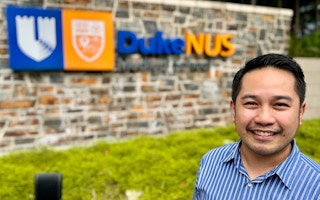A Singapore-based global health institute has recruited Filipino academic Renzo Guinto, a key advocate of the emerging concept of “planetary health”, and tasked him to set up a new Asia-wide network focused on advancing collaboration on healthcare research and advocacy.
To continue reading, subscribe to Eco‑Business.
There's something for everyone. We offer a range of subscription plans.
- Access our stories and receive our Insights Weekly newsletter with the free EB Member plan.
- Unlock unlimited access to our content and archive with EB Circle.
- Publish your content with EB Premium.
Guinto has moved into the new role as associate professor at SingHealth Duke-NUS Global Health Institute (SDGHI), run by the Duke-NUS Medical School, a graduate medical school in Singapore.
The appointment comes after Guinto spent nearly four years at private non-profit healthcare institution St Luke’s Medical Centre in Quezon City. He has relocated from the Philippines to Singapore, but will stay on as visiting professor at St Luke’s and continue to look into health issues in his home country.
On the new health alliance that he is helping to set up this year, Guinto told Eco-Business that it is “a dream” that he shares with many peers at healthcare institutes across the region.
The Covid-19 pandemic cast a spotlight on the interconnectedness of the health of nations and the importance of collaboration, including at the regional level, he said. Southeast Asian researchers are interested in the idea of “decolonising global health” and it is “timely and relevant” to set up a network to focus on education, research and advocacy aimed at advancing health equity and wellbeing closer to home, said Guinto.
“Hopefully it will strengthen health solidarity in the region,” he said.
Planetary health refers to the concept that health of both people and planet can be taken care of in an integrated way. Guinto said: “Asia is at the heart of many of these ‘planetary health’ crises. It can also be the source of solutions and innovations that will tackle these problems.”
In recent months, Guinto’s profile has risen as one of the few important voices in Southeast Asia advocating for planetary health to be recognised.
Last month, Guinto was named senior honorary visiting fellow at the University of Cambridge in the United Kingdom. He also sits on an expert panel for the Climate Change Commission of the Philippines that looks at health sector reforms in the climate-vulnerable country. At the COP28 climate summit in Dubai last December, Guinto was the only Southeast Asian representative appointed to a new 13-member advisory group on ethics in climate health policy under the World Health Organisation (WHO).
Guinto said he will bring on-the-ground insights to global discussions so that more people will understand how communities in Southeast Asia are affected by climate change, as well as how they are mobilising to address social and health impacts related to extreme weather events, from typhoons in the Philippines to extreme heat in Singapore. His work will focus on practical issues faced by governments, including how to implement climate-smart healthcare systems when resources are limited.
On the sidelines of the COP28 negotiations, WHO and the World Meterological Organisation (WMO) also appointed the Heat Resilience and Performance Centre at Singapore’s NUS Yong Loo Lin School of Medicine as the Southeast Asian node for its health information network.
In his new role at SDGHI, Guinto will be involved in launching new graduate and executive education programmes on global health, and help develop the institute’s research and policy portfolio in planetary health.












